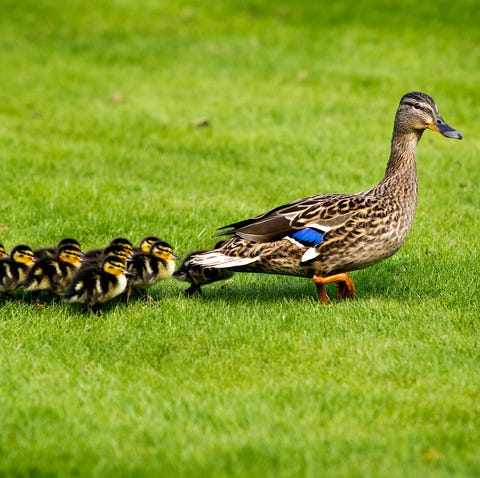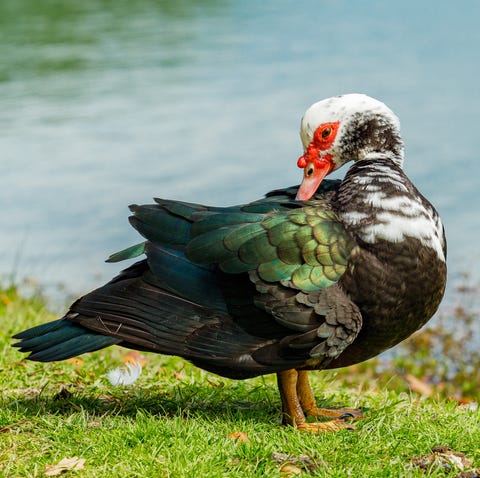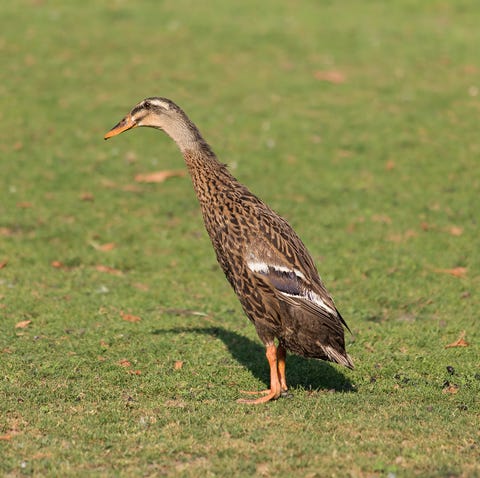Picture of Different Ducks in One Picture
Find out everything you need to know about keeping ducks for beginners, including the best duck breeds, what equipment you'll need and where to house ducks in your garden. We also look at what to feed ducks, what to do with duck eggs and how to protect them from foxes.
Ducks are the comedians of the poultry world. All you need to start keeping ducks is enough space for them to dabble and preen, a pond with access to a simple duck house and a run to protect them from predators. Some breeds of duck lay a large number of eggs, their droppings will turn your compost into top-grade fertiliser, while their slug hunting prowess is legendary.
How to start keeping ducks
Before buying your first team of ducks, check that your neighbours won't mind a raucous dawn chorus in spring and then charm friends for surplus stock or scour poultry magazines. The British Waterfowl Association or Call Duck Association can also help. Keep the ratio of ducks to drakes at around five to one (or frisky drakes can give the ducks a hard time).

It's also important to know how keeping ducks differs to keeping chicken. Chickens are well-behaved school prefects – bright, reliable but prone to bossiness. Ducks, in contrast, are rowdy teenagers – noisy, messy and lots of fun. Chickens and ducks might stick together during the day, wandering around as a gang, but come the evening the chickens and ducks part ways and head for their separate huts.
Putting them in the same house doesn't work – chickens need to roost on a perch while ducks sleep at ground level. Having one above the other would be a recipe for disaster. And, like children, bedtime routines are different for both types of birds. Chickens, good as gold, put themselves to bed, while the ducks would carry on the party given half the chance and need shooing indoors.
4 of the best duck breeds for smallholders
FOR EGGS: CAMPBELL DUCKS – First-rate egg layers, Campbells (khaki, below) are a favourite of commercial egg producers, but have a gentle temperament, making them ideal for smallholders with children.

Chris Lishman Getty Images
FOR MEAT: MUSCOVY DUCKS – Bred primarily for the table but also good egg-layers, Muscovy ducks are big birds but very quiet. Better for a larger pen or, if it's safe, left to free-range forage.

James Goodall / 500px Getty Images
FOR GARDENERS: CALL DUCKS – The smallest domestic duck, Calls are very pretty, easy to handle and great for gardens, as they're least likely to nibble seedlings. They do, however, have a loud quack, so avoid if you have close neighbours.

vxlomegav6 Getty Images
FOR PETS: INDIAN RUNNER DUCKS – These are flightless so don't need their wings clipping. Good layers, they will keep you endlessly entertained as they rush around at speed.

Denis Linine Getty Images
Where to keep ducks in your garden or smallholding
No one who has seen how ducks take to water would deny them a pond. The Domestic Fowl Trust supplies a basic pond, but ducks are messy, so the bigger it is, the better. They will also need a netted run (£295, Amazon - or make your own), but try to let them wander as much as possible – bearing in mind their security and how fussy a gardener you are. Make sure your breeder supplies newcomers with wings already trimmed, because they need to be curtailed until they know their address.
Ducks are hardy and great fun to keep. Allow plenty of space, keep bedding clean and dry, offer shade in summer and shelter in winter, and your flock will repay your efforts a hundredfold.
How to fox-proof a duck pen
Foxes help to keep wild pest populations, such as rabbits, under control but can devastate a hen or duck enclosure. When it comes to keeping poultry safe from predators, fencing needs to be at least 2m high with an extra 30cm overhang, and dug into the ground at least 30cm to prevent a fox burrowing underneath.
'Chain link' fencing is tougher than normal chicken wire, which foxes have been known to chew through. Flexible electric fencing is another effective option – you can get a kit with a 50m roll of netting, poles and battery pack for around £250, but it isn't always suitable if you have small children and other pets. Hedgehogs can also get frazzled trying to climb through electric netting, so choose a net with a small grid size to avoid this happening. If a fox does visit and kill a few birds, but knows there are more left alive, be extra vigilant for a repeat attack.
What to feed ducks
Ducks need water, grit to digest food, plus grain and feed. An omnivorous diet of grain, in the form of mixed corn with a little protein, bought as pellets (Allen & Page and Marriage's are good brands) will satisfy. This can be supplemented with garden insects and leftover rice, bread and pasta. Feed your birds from a hopper in their house in the morning and then again in the evening to lure them to bed. Ducks can see in the dark and will not head to bed without bribery.

What to do with duck eggs
Duck eggs are underrated. However, their shells are more porous than those of other poultry, so bacteria can pass into the egg easily, especially if the flock is kept in mucky conditions. With scrupulous hygiene and prompt collection – their shelf life is a mere eight days – your duck eggs will be safe and brilliant for baking, though less likely to whip up to a peak (so no meringues or soufflés). You don't need a drake for your ducks to lay. Store them in an airtight container.
How to care for ducklings
As an experienced duck keeper, you may decide you want to increase numbers. Fertile eggs take 28 days to hatch. Ducklings are enchanting to raise, although with more ducks comes extra mess. It can be hard to contemplate, but excess drakes are best killed young for meat (with expert attention) – though having had a good life, they will be very tasty.
Books about keeping ducks
- Keeping a Few Ducks in your Garden by Francine Raymond BUY NOW
- The Domestic Duck by Chris and Mike Ashton BUY NOW
This content is created and maintained by a third party, and imported onto this page to help users provide their email addresses. You may be able to find more information about this and similar content at piano.io
Picture of Different Ducks in One Picture
Source: https://www.countryliving.com/uk/wildlife/farming/how-to/a232/keeping-ducks/